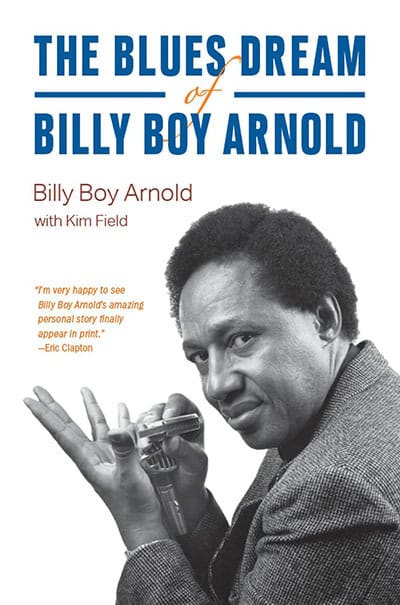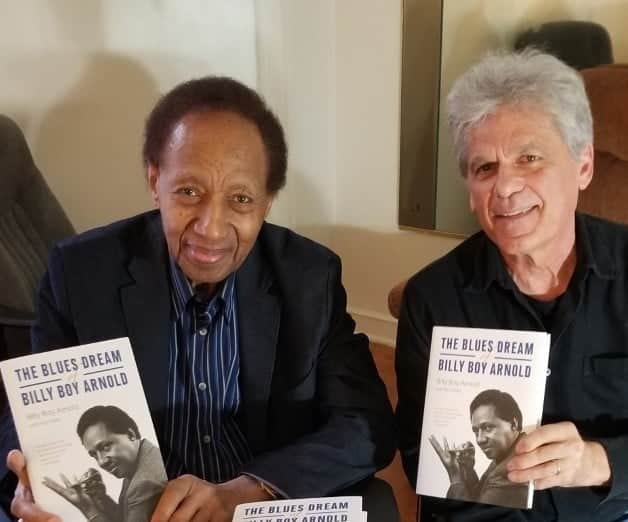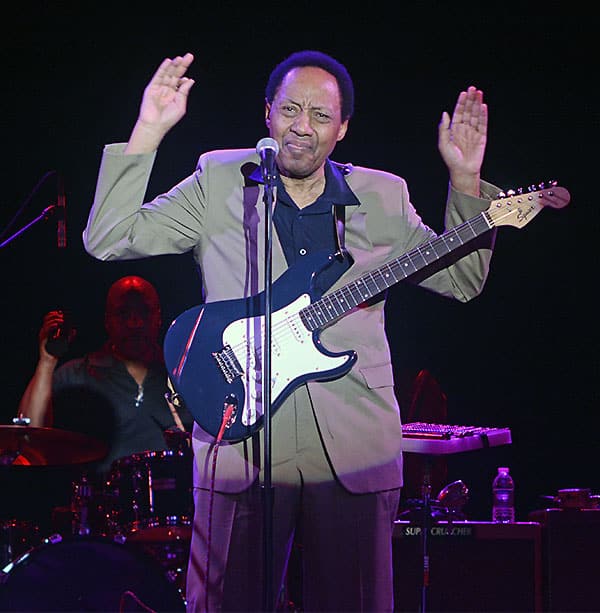
Music lovers with an appreciation for history will forever be grateful an octogenarian gathered his life’s experiences and put them in a book, “The Blues Dream of Billy Boy Arnold.”
Chicago in the mid-1950s to early ’60 was the most seminal era of American music. It’s where country acoustic Delta blues was electrified, urbanized and where rock ‘n’ roll was kindled. It’s remarkable that in extraordinary times most who live through them don’t realize it. But even as a child, William “Billy Boy” Arnold was hardly circumspect. He loved the visceral songs Ray Charles called “black-bottom goodies.”
Inspired by sound trucks that he chased through his South Side neighborhood, the youngster sought and approached every musician he could find, and his city was full of them. Memphis Minnie was at first irritated by his eagerness. But most, such as Muddy Waters and Blind John Davis, were congenial and helpful. The ultimate mentor and the influencer for his career was Sonny Boy Williamson, the musician who made harmonica the lead blues instrument for the hundreds of South Side and West Side venues. The book is dedicated to him.
Like an investigative reporter, brash 12-year-old Billy Boy found Williamson’s house, knocked on the door and befriended him. But soon afterwards, Williamson was killed. But his name lived on in the person of Rice Miller, who assumed the stage name Sonny Boy Williamson. Pre-internet days, such an ostentatious act could be pulled off. Blues followers know the difference between Sonny Boy 1 and Sonny Boy 2, and this book is for them because it tells this fascinating backstory and pretty much all the backstories of what Billy Boy Arnold witnessed and experienced. Emphasis on tells: Arnold’s biography is written in a conversational style, with the delivery and nomenclature of someone from his generation. The words were transcribed and arranged by partner Kim Field, who recorded 60 hours of interviews.
I’ve been a devout blues follower ever since seeing Albert King play in San Luis Obispo in 1984. Chicago blues is my favorite. “The Blues Dream of Billy Boy Arnold” taught me more about this music than any other source. The real story about Sonny Boy Williamson’s death is detailed in this book. The mysterious Little Walter is profiled. I’d known Earl Hooker was one of the greatest blues guitarists, but until now didn’t know why he didn’t have much of a career. And I certainly didn’t know about his crazy sister. There are insights to Tampa Red, Elmore James, Otis Spann, Jimmy Rogers and the band The Aces, which for a time included Junior Wells. Lesser-known artists also are described, including the talented and underappreciated guitarist Jody Williams. This book is the ultimate liner notes, complete with maps, photos, discography, footnotes and an index of everyone mentioned. It goes as a reference guide now next to my CDs and records, along with “Bitten By The Blues, The Alligator Records Story,” published last year, also by The University of Chicago Press.
Arnold, 85, has an excellent memory, intact helpfully in that he never smoked and rarely drinks. “I remember everything because this is very important stuff to me,” he wrote in the introduction. Arnold tells stories matter-of-factly, not judgementally or with bitterness, even when he talks about Sonny Boy 2 Rice Miller. (His description of his confrontation with Miller is pure gold.) But Arnold never holds back on his opinions about people or their music.
Arnold’s grandparents were among the first of The Great Migration (1916-1970) of blacks from the South to North, with Chicago at the time referred to as “The Promised Land.” Race relations are not described with sadness or anger but it’s a part of Arnold and his peers’ everyday life. He experienced Jim Crow oppression during a few tours and was candid about his view of the South: The weather is its only redeeming quality.
Arnold said much of the black population in the 1950s was indifferent and even disparaging of blues music, preferring jazz. He points out that jazz was derived from blues. However, the live audiences were entirely black until the early 1960s. Arnold was among the first to welcome young white players such as Paul Butterfield, Charlie Musselwhite and Elvin Bishop to jam onstage. Arnold’s brother Jerome was a member of the Paul Butterfield Blues Band, which connected white audiences to blues music.
As an artist, Arnold’s career was buoyed very early by recording a pair of hit songs, “I Wish You Would” and “I Ain’t Got You.” Being a superb harmonica player with smooth singing voice and ability to cross musical genres has allowed him to remain successful up to this day. A most fascinating part of the book Arnold’s integral role in his role in starting the recording career of Ellas McDaniel and how he inadvertently gave him the name Bo Diddley.
“The Blues Dream of Billy Boy Arnold” is a fast, captivating read. Early book sales are strong and reviews have been outstanding, Field said.
As with all great books, a reader doesn’t want it to end. It’s more stories than storyline. The final chapter didn’t transition as seamlessly from its preceding section as the rest of the book had. It stands on its own with Arnold’s philosophy and documentation of the litany of influential musicians. Field didn’t leave anything out, and that’s a wonderful thing.
-Tim Parsons

- ‘The Blues Dream of Billy Boy Arnold’
- Author: Billy Boy Arnold with Kim Field
- The University of Chicago Press
- Release: Nov. 19, 2021

